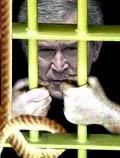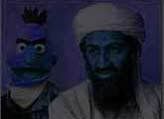| Find |
Wednesday, 20 February 2008
Al-Sadr Threatens to End Cease-Fire
BAGHDAD - Anti-U.S. cleric Muqtada al-Sadr may let a six-month cease-fire expire as soon as Saturday, a move that could send his Shiite militia fighters back out on the streets and jeopardize recent security gains that have led to a sharp decline in violence.
Iraqi police, meanwhile, held funerals Wednesday for 14 officers killed the night before as they responded to a rocket attack launched from a predominantly Shiite neighborhood against U.S. bases in the capital.
In a separate attack, three American troops were killed by a roadside bomb Tuesday night in northwestern Baghdad, the U.S. military said. Their names were not released.
Al-Sadr's Shiite Mahdi Army is among the most powerful militias in Iraq, and the cease-fire he ordered last August has been credited with helping reduce violence around Iraq by 60 percent or more in the past six months.
Sheik Salah al-Obeidi, a spokesman for al-Sadr in the Shiite holy city of Najaf, said that if the cleric failed to issue a statement by Saturday saying that the cease-fire was extended, "then that means the freeze is over." Al-Sadr's followers would be free to resume attacks.
On an Internet site representing al-Sadr, al-Obeidi said that al-Sadr "either will announce the extension or will stay silent and not announce anything. If stays silent, that means that the freeze is over."
Al-Obeidi said that message "has been conveyed to all Mahdi Army members nationwide."
Rear Adm. Gregory Smith, a military spokesman, said in an e-mailed statement that the cease-fire declared by al-Sadr's last August was good for the Iraqi people.
"Al-Sayyid Muqtada al-Sadr's cease-fire has been helpful in reducing violence and has led to improved security in Iraq. We would welcome the extension of the cease-fire as a positive step," he said, using an honorific reserved for senior clerics.
While the U.S. has welcomed the cease-fire, it also has insisted on continuing to stage raids against what it calls Iranian-backed breakaway factions of the Mahdi Army militia - moved that have angered the cleric's followers. More
Posted at
15:49
![]()
Post Title: Al-Sadr Threatens to End Cease-Fire
![[Zionazis-1.jpg]](https://blogger.googleusercontent.com/img/b/R29vZ2xl/AVvXsEg_x8DOGucgHQmfJJujuK_oYJdxhEnskhQqt-Og7lSk52HeaDQYzW8NQWfdpHmPgj_FJN0jJ3tz1prR1jVZHdHky2HDQxxcs4LVxX0DtAt3fG0sfRr6MDx7Sz8cJNjl0k0RS9TbCjangQ/s1600/Zionazis-1.jpg)




